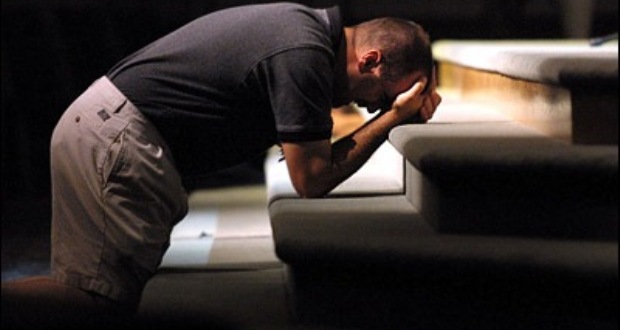The Origin Of Lent

[simpleazon-image align=”left” asin=”1612787673″ locale=”us” height=”500″ src=”http://ecx.images-amazon.com/images/I/41T-pK75zEL.jpg” width=”312″]One of the very beautiful things about the holy Roman Catholic Church, is that it is filled with very rich traditions that go all the way back to the very early Christians – some of which go all the way back to Jesus’ times. Lent is one of these traditions. A very important point to note about the traditions of the Catholic Church is that they are meant to help us to remember. What almost immediately comes to mind is Jesus at the Last Supper where he tells his disciples to ‘do this in memory of me’.
With each new season in the Roman Catholic Church, there is some different aspect of our spirituality that is brought into focus. It does not mean that that particular aspect of our spirituality or our faith, is not focused on or lived outside that season. With each passage of time, and as we go through the various seasons in the Catholic Church, spiritual growth is meant to take place in our lives. That growth should ultimately cause us to live that particular aspect of our faith not just in the season but throughout our lives. A good example of this is the season of Christmas when the church remembers the birth of Jesus Christ, the coming of Jesus as man to live with us. We remember at that time of year that Christmas is all about love – God’s love for us, and so there is a great outpouring of love at Christmas time. Does this mean that the out pouring of love should end when the Christmas season does? No it does not. But with each Christmas season that goes by, and our spirituality and our faith increases, living the message of Christmas can be translated into a day to day experience. The same applies to Lent, Easter, and all of the other seasons within the holy Roman Catholic Church that causes us to remember a particular event or pay particular attention to some aspect of our faith.
Lent is a Catholic tradition that goes all the way back to the very early Christians. Lent is meant to be a period of purification, and in the wisdom of the Church it is immediately followed by the season of Easter – comprising of 50 days. So we have a combination of 90 days in the Church’s calendar that is set aside for purification, self examination of one’s conscience, and celebrating the salvation of our God.
In growing up, I always thought, in fact I was taught that Lent was about giving up things. To this day that aspect of Lent seems to be the one that is on most people’s minds. Not too long ago at the office, one of my colleagues asked me what I was going to give up in Lent. Many Catholics and even many non-Catholics define Lent as the giving up of something – movies, meat, candies, I even heard someone said that they will give up gossiping in Lent. While self-sacrificing and the giving up of things is a great practice, there is an even greater aspect of what Lent is about, and the giving up of things can be an excuse not to deal with the real issues in our lives that we should turn over to God. In the middle of the 1960s, the church had one of its big meetings called the second Vatican Council, and one of the things that came out of this Council was the re-definition of what Lent is. The Church decided to go back to the ancient meaning of Lent, back in the days of the very early Christians. The original and much more fundamental reason of Lent, which is baptism, was rediscovered.
Lent began in the early centuries, and was used as a time to prepare new members for the Church. The early Christians tried to imitate Jesus Christ and the way that he lived by translating what he did into their lives, and in the way they prepared others to be received into the Church. They felt that since Jesus spent 40 days and 40 nights in prayer and fasting in the desert before starting His ministry, part of the preparation of early Christians to be was that of 40 days of intense prayer and fasting in preparation for their baptism. With the second Vatican Council, this aspect of Lent, that of baptism, was brought back into focus. Now this does not mean that the giving up of things during Lent is not a good practice and should not be done. What it does mean is that yes, it is good to give up things; yes it is good to pray and fast, in fact it is extremely good; yes it is good to give alms; but the reason for doing it is because of our baptism.
The word Lent actually means springtime or a new spring. If you live in a country, like I do, that does not experience winter, then the concept of what spring is may be somewhat difficult to identify with. Springtime is the season that immediately follows winter. While I do not live in a country that has winter – thank God for that – I have experienced winter. During wintertime the birds of the air fly to warmer places, so the beautiful sound of birds singing is nonexistent during this time. During wintertime most trees would have no leaves on them as they would all have fallen off in preparation for the cold weather that was on its way. During wintertime, most rivers and streams are frozen solid, so that the beauty of flowing streams, of gentle streams, the sound of the water flowing is no longer there. During winter, the beauty of the surroundings is lost in the blanket of white snow that covers everything. During wintertime, because outside is so cold, one’s movement is restricted, and unless you absolutely have to, most people will stay indoors. You will not see God’s creatures such as rabbits hopping around in the field; no squirrels skipping from branch to branch. I hope you’re getting the picture that I’m trying to paint here for those of you who do not know what winter is about.
Ahh! But spring brings an end to all of this. The ice melts, the birds come back home and once again you can hear the beautiful sound of the birds singing, new leaves shoot on the trees, all of God’s creations come out; the rabbits hop from one place to another, the squirrels branch from tree to tree, fishes swim in the lakes and streams, and all of mankind can move about a lot freer because it is not that cold outside anymore. Spring is about newness; it’s about starting over; it’s about new life. This is what Lent is about. Lent is about new beginnings; it is about change and transformation of one’s life; it’s about newness and a renewal of one’s faith and baptismal promises. Now, this is the connection with what I shared earlier. Because it is about renewing our baptism promise, because it is about newness in Christ Jesus, because it is about change and transformation from death and nothingness, to new life, then for all of this to happen requires a lot of self sacrificing and dying to ourselves. Here is where the giving up of things, the examination of our consciences and ourselves – not in the light of the world for we know that it is filled with darkness, but in the light of Jesus Christ. A true examination of oneself and of our consciences in the light of Christ, will always challenge us to change, to repent, to give up our bad habits, to make sacrifices.
Lent prepares us for the wonderful and glorious light of Easter when we celebrate Jesus’s victory once and for all over hell, over sin, over death.
Finally, many Catholic during this joyful season of Lent, seek to give up things in their lives; and in most instances, they seek to give up tangible things, and pick them back up after Lent is over. But what does God really require of us? He wants our hearts; our hearts turned towards Him. He wants our love; our love to Him first and foremost. He wants us to love Him above all else. So what we should truly seek to give up during this season and every day of our lives for that matter, is sin. Anything that keeps us from God we should give up – and not pick back up after the season is over.
If your sin is a bad temper, then give it up! If your sin is weakness to things of the flesh, then give it up! Give it up brother! Give it up sister! If your sin is infidelity in marriage, give it up! If your sin is anger and bitterness and resentment – GIVE IT UP! You cannot enter the Kingdom of Heaven with these! If your sin is that of discouragement, Sister, Brother; let it go – give it up! If your sin is being abusive to your wife and children, then my Brother, give it up in the Name of Jesus! If your sin – your weakness – is gambling and you have lied to your family about it; then in the Powerful Name of Jesus, let it go! Give it up and be free! If your sin – that which can cause you to go to hell – is that of sexual perversion; if you are trapped in the darkness of same sex relations, know that God our loving Father has a much better plan in store for you! GIVE IT UP! GIVE IT UP IN THE NAME OF JESUS CHRIST THE SON OF THE LIVING GOD and be FREE! And he or she who the SON sets free IS FREE INDEED! Give it up! Its not worth giving up your inheritance for. Its not worth going to hell for! Nothing is worth going to hell for! If your sin is alcoholism. You have a drinking problem, a very serious one at that. It is destroying your family. You are never there for them in a sober state of mind. Come to the cross of Jesus and lay your burdens down there and walk away from it a free man, a free woman in the Name of Jesus.
These are the things that God challenges us to give up during Lent and throughout our lives, and never to return to then. For as we release them, as we give them up, as we lay them down at the feet of our Burden Bearer, God’s grace is poured out upon us, that will empower us to be changed, be transformed, be healed, be delivered from all that seeks to bind us and keep us from experiencing the Wonderful, Awesome, Unconditional Love of God.
During this season of Lent, may the Spirit of God move in our hearts in such a powerful way so as to cause us to recognize and to turn away from all that is in us, in our lives that causes us to turn away from God. AMEN! So be it! AMEN!






